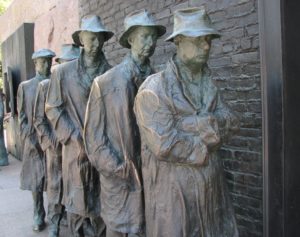
FDR Memorial: Breadline statue (ca. 2007) at the Franklin Delano Roosevelt Memorial beside the Tidal Basin in Washington, D.C. by George Segal
In a nation where an estimated 1 in 6 Americans go hungry on a daily basis and where public officials regularly enforce a national allegiance to Christianity and its principles, how is it possible that 31 major cities across the country have laws on the books or have applied community pressure to ban giving food to the homeless or hungry?
It sounds illogical, nonsensical, but that’s exactly what’s happening across the United States, according to the National Coalition for the Homeless.
The coalition felt so strongly about the issue that it published a report last fall called “Food-Sharing Report: The Criminalization of Efforts to Feed People in Need.”
“In recent years, cities across the nation have established a precedent of criminalizing homelessness and pushing the problem out of sight,” the coalition stated in its report. “One method that has become more popular has been to introduce new legislation, designed with the intention of restricting individuals and groups from sharing food with people experiencing homelessness.”
In many cities across the US, a disproportionately large percentage of the homeless population is African-American—individuals who have been dealt a succession of harsh blows by an unforgiving system. That is definitely the case in cities like Seattle, where the homeless population has exploded.
A recent report in the Washington Post also focused in on this issue of pressuring individuals to stop feeding the homeless.
“Late last year, police in Fort Lauderdale busted a 90-year-old World War II veteran named Arnold Abbott twice in one week for feeding the homeless,” the Post reported. “In Raleigh, N.C., a church group said the cops threatened to arrest them if they served food to the homeless. And in Daytona Beach, Fla., authorities unsuccessfully levied $2000 in fines against six people for feeding the homeless at a park.”
The coalition said there are three pervasive myths that allow municipalities to get away with telling the public not to feed the homeless and hungry.
Myth 1: Sharing food with people enables the homeless to remain homeless.
Myth 2: There are more than enough existing meal programs and they waste unused food.
Myth 3: If you stop feeding them, they will disappear.
The coalition’s report debunks these myths in short order. As for the first myth, the coalition maintains that food-sharing programs are often the only healthy safe food homeless people have access to.
“Individuals do not remain homeless because of food-sharing programs; people remain homeless for reasons such as: lack of affordable housing, lack of job opportunity, mental health or physical disability,” the report said. “With all of the existing barriers that prevent individuals from finding work, earning an adequate wage, affording a safe home, and caring for themselves, remaining homeless is rarely a choice at all.”
As for the second myth, the report says food providers in actuality are “overwhelmed and often underresourced.” Federal cuts in the Supplemental Nutrition Assistance Program (SNAP), popularly known as food stamps, have just made matters worse. In November 2013, the federal government cut the food stamp program by 6 percent.
Countering the third myth, the report said, “There are many reasons why people are homeless, including the lack of affordable housing, lack of job opportunities, mental health and addiction, and physical disabilities. This is a multi-dimensional problem, and it should be approached in that manner. To make homelessness disappear, cities have to be creative and address all the root causes of homelessness.”
The report included a comprehensive list of cities that either ban food sharing or actively try to discourage it. These cities include: Atlanta, Birmingham, Las Vegas, Oklahoma City, Phoenix, Denver, Sacramento, Los Angeles, Miami, Orlando, Indianapolis, Baltimore, Nashville, Seattle and Dayton.
“The Right to Food has been recognized as an international human right for many years, however, not until November, 19th, 2009 did the United States and the Obama administration join the consensus on the Right to Food,” the coalition wrote. “Many would say the reason for such hesitation by the US government to join the rest of the world is that, since the Cold War, the United States has distanced itself from social and cultural rights. On the domestic level, critics would say that the right to food is not protected by the US Constitution and it doesn’t fit with our culture. With a new position on the right to food, food scarcity and malnourishment will hopefully become part of international domestic conversations.”
Since the US is now aligned with 185 nations around the world to protect citizens from facing hunger, the coalition said the 31 municipalities that are criminalizing food sharing are violating the international consensus and “also disregard the First Amendment right of religious organizations to exercise their faith and assist their less-fortunate neighbors.”
“Homeless individuals are susceptible to a large number of health concerns and often require additional assistance to maintain relatively healthy lifestyles,” the report concluded. “Nutritional support can help them stay out of the emergency health care system and focus on measures to escape homelessness. Budget cuts and criminalization efforts are misdirected, narrow in scope, and neglect to make long-term policy changes that work to eradicate homelessness.”


